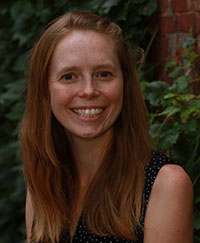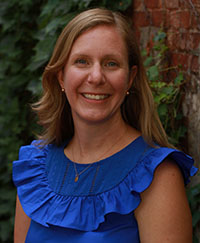Power to Change: Math as a Social-Emotional Language in a Classroom of Four- and Five-Year-Olds
by Elinor J. Albin and Gretchen Vice
“Can I help you? I see you’re not feeling that powerful.” A five-year-old girl quietly approaches a peer who has just moved a picture of herself down a number line from a 10 to a 1. The number lines are part of an interactive documentation wall on the side of the classroom nearest to the block area. The child, who was approached by her peer, looks up from her work at a round table nearby and makes eye contact with the other child. The two girls sit next to each other at the table, occasionally looking up and smiling at one another as they work.
The connection between numeracy and social-emotional learning may not be obvious when discussing the ins and outs of school for four and five year olds. Social-emotional learning—teaching children how to manage their emotions—is a foundation of any early childhood classroom (Tominey, O’Bryon, Rivers, & Shapses, 2017). Building emotional intelligence happens during every interaction, not to mention through dramatic play, storytelling, and reading books.
Mathematics is ever present within the early childhood classroom as well. Children construct with blocks, sort and categorize at the sensory table, and develop numeracy skills through morning meeting routines, such as finding patterns on the calendar or counting how many people are at school each day (Fosnot, C. T., & Dolk, M., 2001). Mathematical thinking is intrinsically part of every young child’s day.
About the Authors
 Elinor J. Albin is an early childhood educator at The Advent School in Boston, MA. EJ received her Master’s in Education in Teacher Leadership with a specialization in literacy at the University of New Hampshire. She is passionate about social justice issues and bringing nature into the classroom. During her 10 years as an early child educator, she has shared her expertise with her colleagues through presenting at conferences, leading a faculty committee on social justice, and spearheading the redesign of the outdoor play and learning space at The Advent School.
Elinor J. Albin is an early childhood educator at The Advent School in Boston, MA. EJ received her Master’s in Education in Teacher Leadership with a specialization in literacy at the University of New Hampshire. She is passionate about social justice issues and bringing nature into the classroom. During her 10 years as an early child educator, she has shared her expertise with her colleagues through presenting at conferences, leading a faculty committee on social justice, and spearheading the redesign of the outdoor play and learning space at The Advent School.
 Gretchen Vice, GSE ’01, is Dean of Faculty at The Advent School, an independent progressive elementary school in Boston, MA. After receiving her master’s in Early Childhood/Elementary Education from Bank Street College in 2001, she was a classroom teacher for many years before becoming a math instructional coach. Now, with 20 years of experience working in elementary schools, both in the United States and Australia, she is excited about working with teachers on their professional growth and building their pedagogy, especially in regards to mathematics education.
Gretchen Vice, GSE ’01, is Dean of Faculty at The Advent School, an independent progressive elementary school in Boston, MA. After receiving her master’s in Early Childhood/Elementary Education from Bank Street College in 2001, she was a classroom teacher for many years before becoming a math instructional coach. Now, with 20 years of experience working in elementary schools, both in the United States and Australia, she is excited about working with teachers on their professional growth and building their pedagogy, especially in regards to mathematics education.